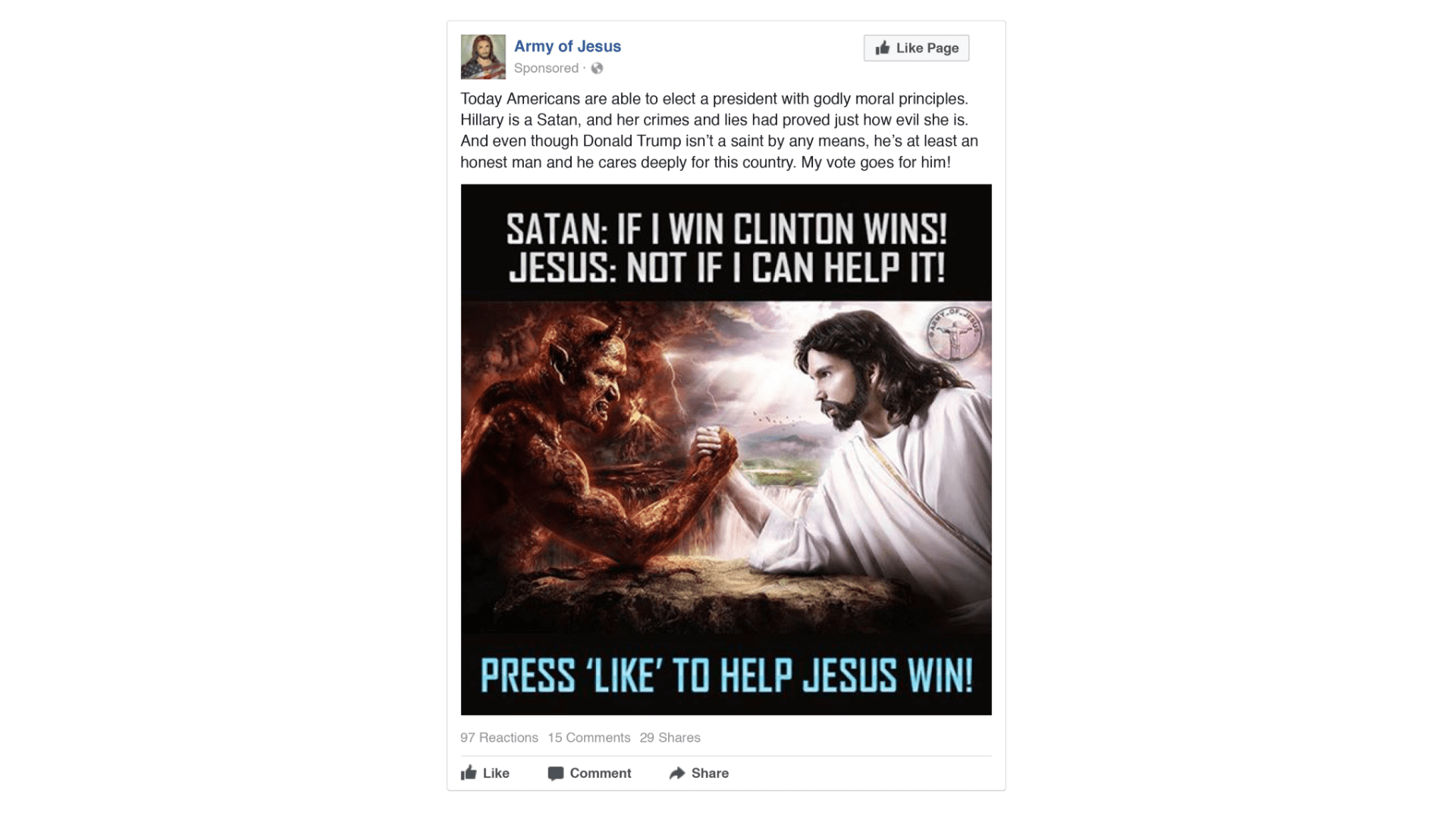
The conspiracy theory “Q-Anon” has been in the headlines lately. A few years ago it was an internet phenomenon known only to those familiar with the web’s most unruly message boards. But today there are people openly flirting with the movement from the country’s highest political platforms.
Recent news stories have noted its growing influence in evangelical circles. I have personally observed Southern Baptists sharing Q-related content on their social media channels, some of them in positions of leadership.
Despite Q-Anon’s stint in the limelight, Christians should reject the movement’s fanatical and dangerous messages. Below is a brief description of Q-Anon followed by four reasons I believe the movement threatens our public witness if Southern Baptists consume and share its content.
What is Q-Anon?
Q-Anon is a sprawling conspiracy theory centered on the idea that a global cabal of leftist elites – “the deep state” – is secretly plotting against U.S. President Donald Trump and his supporters.
The movement’s followers craft elaborate tales of super-wealthy liberal politicians, officials and celebrities engaging in child sex trafficking, media manipulation, abuse of government power and other criminal acts.
Some followers believe members of the cabal participate in satanic cults that kidnap, rape and torture young children in order to harvest a psychotropic chemical called adrenochrome from their blood.
An anonymous individual or small group known as “Q” (the U.S. Energy Department’s designation for its highest security clearance) posts cryptic messages on web forums with allegedly classified information couched in military-like jargon.
These messages are known as “Q drops.” Followers crowdsource interpretations of Q’s revelations in discussions on online forums, social media interactions, YouTube videos and podcasts.
The tangled web of speculation has its origins in the 2016 presidential campaign season.
The most famous Q drop occurred Oct. 28, 2017 under the title “Hillary Clinton Extradition.” The 66-word message was posted on a notoriously uncensored forum called “4chan.” It claimed federal officials were in the process of arresting then-presidential candidate Hillary Clinton and National Guard troops were mobilizing in major cities across the U.S. to mitigate potential riots.
The false information traveled far and wide as social media users shared the inflammatory rumor with the help of memes. Memes (pronounced “meems”) are pithy, provocative or humorous images with text that can be easily shared on social media.
Q claims to be on a heroic mission to “wake up” Americans to the deep state’s evil plans while rallying “digital soldiers” behind the hope that a “Great Awakening” or “Storm” is coming.
Many Q followers believe President Trump will soon expose the dark conspiracy and oversee mass arrests, vindicating the movement as a patriotic rescue operation. “Where we go one, we go all” is their mantra, often repeated through the hashtag #WWG1WGA.
Thousands of social media accounts have been created to promote Q-related ideas. Self-styled documentaries on Youtube are commonly used to convert viewers to Q-Anon beliefs. This process is known as taking the “red pill,” a reference to a well-known scene from the 1999 film “The Matrix.”
Is it a harmless obsession or a real danger?
Engagement with Q ideas may begin as a preoccupation with political nitpicking, but the movement can lure followers into a toxic worldview and lead to potentially dangerous behavior.
The most widespread danger of Q-Anon has been its followers’ ability to effectively spread a high volume of false information on popular websites like Twitter, Facebook and YouTube. Marc-André Argentino, a scholar who has studied the conspiracy theory since 2018, said Q-Anon content on Facebook has increased more than 650% since March 2020.
Q-related ideas, such as “COVID-19 is a hoax to control the 2020 election,” are often laundered through social media accounts that look relatively normal, sometimes posing as credible news outlets. In other cases, individuals share Q-related content unwittingly, without understanding its origin.
A rumor circulated online earlier this year claiming that a Samaritan’s Purse field hospital in New York City’s Central Park was part of a Trump-led sting operation to rescue children being held in underground tunnels for the purpose of sex trafficking and organ harvesting.
The field hospital was actually part of the organization’s emergency response to the COVID-19 pandemic. A spokesperson for Samaritan’s Purse told Politifact the rumors were “totally false.”
Radicalization is another danger of Q-Anon. Two researchers writing for West Point’s Combating Terrorism Center said, “Q-Anon is arguably no longer simply a fringe conspiracy theory but an ideology that has demonstrated its capacity to radicalize to violence individuals at an alarming speed.” They noted five criminal cases where violent acts were related to Q-Anon ideology.
In December 2016, a 28-year-old man named Edgar Maddison Welch from Salisbury, N.C. drove to a pizzeria in Washington, D.C. in an attempt to raid an alleged child sex ring operated by Hillary Clinton’s presidential campaign.
“The world is too afraid to act and I’m too stubborn not to,” he texted a friend two days before embarking on his misguided journey.
Welch entered the Comet Ping Pong restaurant with an AR-15 rifle and a handgun to “self-investigate” the alleged crimes. He was under the impression that enslaved children were being held in the basement of the pizzeria based on videos he binge-watched on YouTube. He fired three shots. Thankfully, no one was injured.
The father of two with reported ties to Baptist life was there to confront evildoers, but discovered the restaurant had no basement and no child slaves. He surrendered peacefully after realizing his error. In 2017 he was sentenced to four years in prison.
Welch believed a conspiracy theory known as “Pizzagate,” a precursor to Q-Anon. Online forum users combed through a massive trove of emails, owned by Clinton campaign chairman John Podesta, that were leaked in 2016 by a group called “Wikileaks.”
Pizzagate followers were convinced they had discovered coded messages that revealed the existence of a child trafficking operation. They interpreted dinner party related conversations about pizza and pasta as pedophiliac sexual preferences for young girls and boys.
A memo published by the FBI on May 30, 2019 designated Q-Anon, Pizzagate and similar conspiracy theories as domestic terror threats. Since then, social media outlets like Twitter and Facebook have been cracking down on accounts that spread such material.
Why should we denounce Q-Anon?
Southern Baptists should remain diligent and careful when sharing posts on social media or promoting certain causes because Q-Anon followers spread false information about issues that matter to our churches.
Here are four Q-Anon themes that overlap with genuine concerns for Southern Baptists:
Pedophilia & Human Trafficking
Q-Anon followers believe many of America’s rich and famous secretly engage in child sex abuse. They promote hashtags such as #savethechildren and speak against human trafficking in ways that normalize their agenda and appeal to new recruits. Southern Baptists care about biblical sexuality and human dignity. We have developed initiatives and passed resolutions to speak to those issues. We must speak up for biblical values with wisdom and competence so that our message is not entangled with the baseless ranting of Q followers.
Moral Leadership
Southern Baptists have long called for character and integrity in the public square. We should continue to advocate for high moral standards from Hollywood to Capitol Hill. It’s our responsibility to hold influential leaders and institutions to account when they fall short, but we cannot participate in spreading scandalous, conspiratorial lies about public figures, even those we may oppose politically.
Media Fairness
Many Southern Baptists and other conservative evangelicals lament the way our worldview is represented in popular culture, especially in the news and entertainment industry. Too often liberal progressive views on issues like sexuality and gender are promoted while traditional and biblical views are mocked. That leaves some Southern Baptists with a general distrust of mainstream media outlets. We should be careful, however, not to let our critiques of the media industry become enmeshed with those who make wild claims about worldwide schemes lurking behind every journalistic slight. Using slurs about mainstream media can blur the lines between substantive critiques and Q-Anon nonsense.
Truth
Q-Anon proponents claim to present truths that have been hidden or covered up. A common refrain among followers is “do your own research.” Yet, the supposed evidence presented is usually speculative at best and immediately falsifiable at worst. As Southern Baptists, we stake our reputation on the truth of scripture. To mix our messages with those that weaponize falsehoods for a political fantasy is devastating to our witness in society. We must stand as Christians who care about truth and denounce conspiracy theories as a dangerous waste of time.
“For every kind of beast and bird, of reptile and sea creature, can be tamed and has been tamed by mankind, but no human being can tame the tongue. It is a restless evil, full of deadly poison. With it we bless our Lord and Father, and with it we curse people who are made in the likeness of God. From the same mouth come blessing and cursing. My brothers, these things ought not to be so.” (James 3:7–10 ESV)


